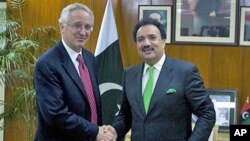Relations between the United States and Pakistan in the last few months have been severely strained by a series of events and ongoing disagreements. The U.S. ambassador to Pakistan spoke to Voice of America about how he feels things are improving.
U.S. Ambassador to Pakistan Cameron Munter said ties between Pakistan and the United States have been far from the best recently, and while there are still differences, there also is room for improvement.
"The issues are still on the plate. We still have to have discussions, but there was a period in February and some parts of March where we just didn’t have good ties. We’ve established a process," said Munter.
Pakistan is seen by Washington and London as a vital ally in the "war on terror," and the Pakistani government and army say they remain committed partners 10 years after the Afghan conflict began.
But, relations have been increasingly strained between the two countries.
Bitter disputes over covert CIA activities and drone attacks inside Pakistan, the security situation in neighboring Afghanistan and rising Islamist-led opposition to the presence of foreign forces in the region are fueling the discourse.
Relations also have been frayed since a CIA contractor fatally shot two Pakistani men in the city of Lahore earlier this year. The U.S. said Raymond Davis had diplomatic immunity and acted in self-defense. He was released after victims' families accepted compensation.
Furthermore, a recent White House report criticized Pakistan's counterterrorism campaign, accusing Islamabad of not doing enough to counter militants in North Waziristan. Pakistan rejected that report.
Munter said that while America may have some advice for their ally, at the end of the day, it is up to the Pakistanis to decide how to proceed.
"Ultimately the decision to bring peace, to bring the authority of the Pakistani leadership to bear in North Waziristan, that’s a decision for Pakistan. We’ve given our advice. Sometimes we may not have been diplomatic about it, but the fact is that’s going to be their decision and we do accept that."
This diplomatic approach means having confidence that Pakistan will step up its efforts to rout out insurgents in safe havens in the tribal regions. Ultimately the U.S. hopes this will put pressure on certain groups there who plan their attacks on international forces in neighboring Afghanistan.




